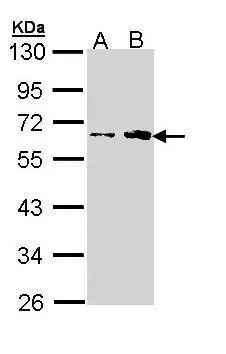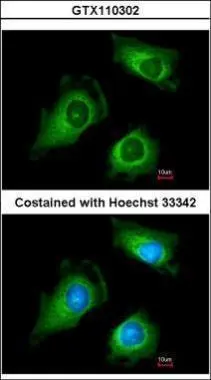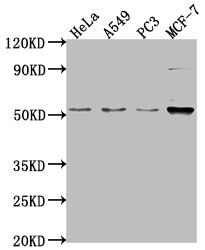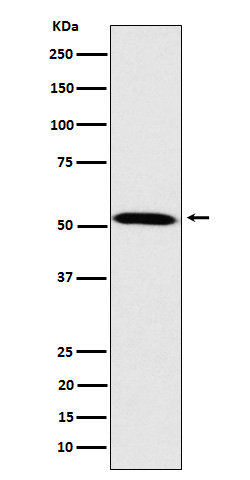
Sample (30 ug of whole cell lysate) A: H1299 B: Hela 10% SDS PAGE GTX110302 diluted at 1:1000
Fukutin antibody [N3C3-2]
GTX110302
ApplicationsImmunoFluorescence, Western Blot, ImmunoCytoChemistry, ImmunoHistoChemistry, ImmunoHistoChemistry Paraffin
Product group Antibodies
ReactivityHuman
TargetFKTN
Overview
- SupplierGeneTex
- Product NameFukutin antibody [N3C3-2]
- Delivery Days Customer9
- Application Supplier NoteWB: 1:500-1:3000. ICC/IF: 1:100-1:1000. *Optimal dilutions/concentrations should be determined by the researcher.Not tested in other applications.
- ApplicationsImmunoFluorescence, Western Blot, ImmunoCytoChemistry, ImmunoHistoChemistry, ImmunoHistoChemistry Paraffin
- CertificationResearch Use Only
- ClonalityPolyclonal
- Concentration1 mg/ml
- ConjugateUnconjugated
- Gene ID2218
- Target nameFKTN
- Target descriptionfukutin
- Target synonymsCMD1X, FCMD, LGMD2M, LGMDR13, MDDGA4, MDDGB4, MDDGC4, ribitol-5-phosphate transferase FKTN, Fukuyama type congenital muscular dystrophy protein, patient fukutin, ribitol-5-phosphate transferase
- HostRabbit
- IsotypeIgG
- Protein IDO75072
- Protein NameRibitol-5-phosphate transferase FKTN
- Scientific DescriptionThe protein encoded by this gene is a putative transmembrane protein that is localized to the cis-Golgi compartment, where it may be involved in the glycosylation of alpha-dystroglycan in skeletal muscle. The encoded protein is thought to be a glycosyltransferase and could play a role in brain development. Defects in this gene are a cause of Fukuyama-type congenital muscular dystrophy (FCMD), Walker-Warburg syndrome (WWS), limb-girdle muscular dystrophy type 2M (LGMD2M), and dilated cardiomyopathy type 1X (CMD1X). Two transcript variants encoding the same protein have been found for this gene. [provided by RefSeq]
- ReactivityHuman
- Storage Instruction-20°C or -80°C,2°C to 8°C
- UNSPSC41116161






